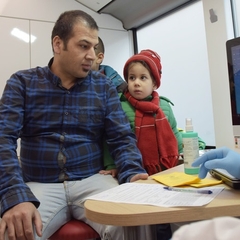Five Struggles of Living With Type 1 in Syria
3 Nov 2015, 12:15 p.m. in Global Stories by Elizabeth Pfiester
Mouhammad’s younger brother is living in Syria with type 1 diabetes. He faces many obstacles, but thanks to support from Mouhammad, who lives and works overseas, he is surviving. One of the lucky ones, Mouhammad’s brother has managed to stay safe and get a fairly regular supply of insulin. Many others do not have the same kinds of resources, so this story is also for them. We are grateful to Mouhammad for sharing the below story with us.
I am the oldest among five siblings. I was a third year medical student when my brother, who was 9 year old, was diagnosed with type 1 diabetes. It was very traumatizing event, which subsequently triggered my interest to become a paediatric endocrinologist. My brother faces many obstacles and challenges living with type 1 diabetes in Syria.
1. Lack of diabetes specialists and other support
To take care of patients with diabetes in Syria is a struggle due to the lack of resources. Now with the war, the situation is even worse. For example, the types of insulin available are only NPH, Regular, and occasionally Lantus. There are no resources to obtain insulin pumps. The care for paediatric patients with type 1 is conducted by the adult endocrinologists because there are no paediatric endocrinologists in the whole country. There are no diabetes educators, dietitians, psychologists, or social workers. The Syrian government provided insulin for free, but unfortunately that changed after the war started.
2. Lack of access to insulin
With the current war situation, safety is a huge issue. My family moved out of the countryside to hide in the capital, Damascus, after the chemical weapon attack. My brother is regularly stopped by the military checkpoints on the way to get his insulin. He walks for about 4 hours, risking his life, every month to get his insulin. The government does not supply insulin for free anymore, so he has to pay out of pocket. Insulin has become extremely expensive after the war.
3. Expensive or unavailable test strips
I do my best to help my brother with his diabetes care. About 8 months ago, he stopped reporting his blood sugar levels to me. He said he forgot to check his levels because he was busy in school. Later, I found out that he was not able to buy glucose strips because there were so expensive and hard to find. Now with the support I send to him, he can afford to check his blood sugar, but only 1-2 times per day.
4. Expired or damaged insulin
About 12 months ago, my brother developed a bad rash. We eventually found out that the rash was due to the expired insulin he was using, which was the only kind available. He has been using expired insulin for at least 12 months now. We are able to get Lantus occasionally from Lebanon through a friend who crosses the borders every 3-4 months.
5. No way to test for ketones
Unfortunately, he can’t afford to see the adult endocrinologist, and even if he could it would be extremely unsafe to get there due to the doctor’s location. I try to address his questions, but he ends up with no help most of the time. There are no ketone strips available, thus it is always horrifying when he has a fever or gets a cold! There are also no psychologists or social workers to help him out with all the stress and worry he is facing.
Despite all the obstacles, my brother is doing pretty well. He finished his first year studying Mechatronics with excellent scores. He is optimistic that things will get better someday, and that he might one day he able to use an insulin pump to have better flexible lifestyle.




